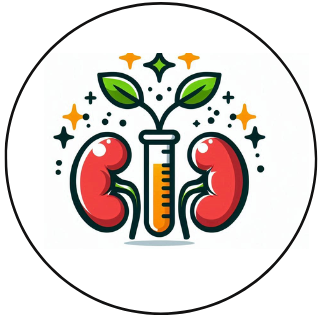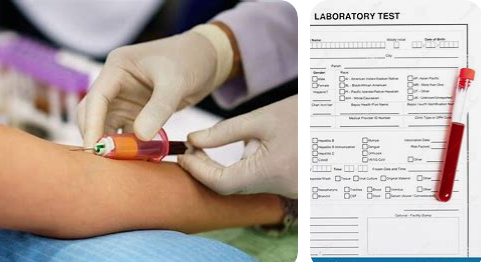Title: How to Read, Interpret, and Understand Lab Tests for Kidney Health
When managing kidney health, regular lab tests are essential to track how well your kidneys are functioning. For someone with kidney disease or at risk of developing it, understanding these test results can be empowering and help you make informed decisions about your health. In this post, we’ll break down the key kidney function markers you’ll see on lab reports, like GFR, creatinine, and others, and explain what they mean for your kidney health.
1. Understanding GFR (Glomerular Filtration Rate)
The Glomerular Filtration Rate (GFR) is one of the most important indicators of kidney function. It estimates how much blood is filtered by your kidneys per minute, giving insight into how well your kidneys are cleaning waste from your body. GFR is typically calculated based on your age, sex, race, and creatinine levels.
- Normal GFR: A GFR of 90 or above is generally considered normal.
- Mildly Decreased GFR: A GFR between 60 and 89 may indicate early-stage kidney disease.
- Moderately Decreased GFR: A GFR between 30 and 59 suggests moderate kidney dysfunction.
- Severely Decreased GFR: A GFR below 30 indicates severe kidney damage.
- End-stage Kidney Disease (ESKD): A GFR less than 15 usually means you may need dialysis or a kidney transplant.
Affiliate Link Idea: You could include a link to a GFR calculator app or website to help users monitor their GFR levels based on their lab results.
2. Creatinine: The Key Waste Product
Creatinine is a waste product that comes from muscle metabolism and is filtered out of your blood by your kidneys. If your kidneys aren’t functioning properly, creatinine levels will rise, indicating reduced kidney filtration.
- Normal Creatinine Levels:
-
- Men: 0.6 to 1.2 mg/dL
- Women: 0.5 to 1.1 mg/dL
- High Creatinine Levels: If your creatinine levels are higher than normal, it might indicate that your kidneys are not filtering efficiently. It’s one of the primary markers used to estimate your GFR.
Affiliate Link Idea: Suggest products like at-home kidney function testing kits, which include creatinine level checks.
3. Blood Urea Nitrogen (BUN) Levels
Blood Urea Nitrogen (BUN) measures the amount of nitrogen in your blood that comes from urea, a waste product formed when your body breaks down proteins. BUN levels rise when your kidneys aren’t filtering waste properly.
- Normal BUN Range: 7 to 20 mg/dL.
- High BUN Levels: Elevated BUN may indicate reduced kidney function, dehydration, or a high-protein diet. It’s often assessed alongside creatinine to determine kidney health.
Affiliate Link Idea: Provide an affiliate link to BUN testing kits or digital resources explaining how to track your kidney function.
4. Albumin-to-Creatinine Ratio (ACR)
The Albumin-to-Creatinine Ratio (ACR) is a test that checks for albumin (a type of protein) in the urine. A healthy kidney filters waste but keeps proteins like albumin out of your urine. The presence of albumin in the urine can indicate kidney damage.
- Normal ACR Levels: Less than 30 mg/g.
- Increased ACR Levels: Higher levels of albumin in the urine can suggest kidney damage and increase the risk of kidney disease progression.
Affiliate Link Idea: Recommend urine test strips for tracking protein levels at home, which can help users monitor their ACR between doctor visits.
5. eGFR (Estimated GFR)
The estimated GFR (eGFR) is an equation that uses your serum creatinine level, age, race, and gender to estimate kidney function. Many lab reports will provide an eGFR value along with your creatinine levels, which helps simplify understanding how well your kidneys are working.
- Normal eGFR: Above 90 is ideal.
- Below Normal eGFR: An eGFR below 60 for three months or more is a sign of chronic kidney disease.
Affiliate Link Idea: Suggest an app or tool that tracks eGFR readings over time, allowing patients to visualize changes in their kidney function.
6. Electrolytes: Sodium, Potassium, and Phosphorus
When your kidneys aren’t functioning properly, they may struggle to balance key electrolytes like sodium, potassium, and phosphorus:
- Sodium: Too much sodium can increase blood pressure and cause fluid retention. It’s crucial for those with kidney issues to monitor sodium intake.
- Potassium: High potassium levels (hyperkalemia) can cause heart problems if not managed properly. People with advanced kidney disease often need to limit potassium in their diet.
- Phosphorus: High phosphorus levels can lead to bone damage and cardiovascular issues in people with kidney disease.
Affiliate Link Idea: Promote low-sodium, low-potassium, and low-phosphorus meal plans or supplements designed for people with kidney disease.
7. Calcium Levels
Your kidneys help regulate calcium levels in your body. If they are not functioning well, calcium can be lost in the urine, which may weaken bones over time.
- Normal Calcium Levels: 8.5 to 10.2 mg/dL.
- Low Calcium Levels: Low calcium could indicate that the kidneys are failing to balance minerals correctly.
Affiliate Link Idea: Recommend calcium and vitamin D supplements that are safe for kidney patients, with a focus on kidney-friendly nutrition.
Conclusion
Understanding your lab results is key to managing kidney health. Knowing your GFR, creatinine levels, and other markers helps you track how well your kidneys are functioning and alerts you to potential problems early. Remember to discuss your results with your healthcare provider to develop a personalized care plan.
Don’t forget to use at-home monitoring tools and health supplements that can support your journey to better kidney health. Small lifestyle changes, combined with a deeper understanding of your lab results, can go a long way in managing kidney disease.
Affiliate Link Suggestions Recap:
- GFR calculator apps
- At-home kidney function testing kits
- Low-sodium and low-potassium meal plans
- Urine test strips for monitoring ACR
- Calcium and vitamin D supplements
Meta Description (SEO): Learn how to read, interpret, and understand kidney function lab tests. Get tips on GFR, creatinine, BUN, and other essential kidney health markers.

